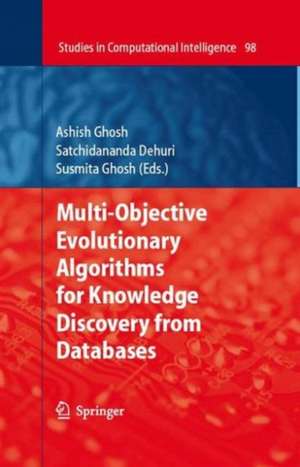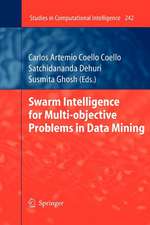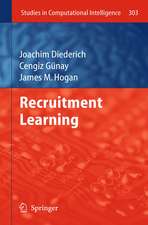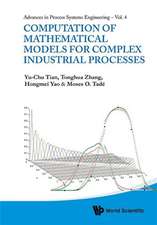Multi-Objective Evolutionary Algorithms for Knowledge Discovery from Databases: Studies in Computational Intelligence, cartea 98
Editat de Ashish Ghosh, Satchidananda Dehuri, Susmita Ghoshen Limba Engleză Hardback – 19 mar 2008
The present volume provides a collection of seven articles containing new and high quality research results demonstrating the significance of Multi-objective Evolutionary Algorithms (MOEA) for data mining tasks in Knowledge Discovery from Databases (KDD). These articles are written by leading experts around the world. It is shown how the different MOEAs can be utilized, both in individual and integrated manner, in various ways to efficiently mine data from large databases.
| Toate formatele și edițiile | Preț | Express |
|---|---|---|
| Paperback (1) | 634.49 lei 6-8 săpt. | |
| Springer Berlin, Heidelberg – 19 noi 2010 | 634.49 lei 6-8 săpt. | |
| Hardback (1) | 640.71 lei 6-8 săpt. | |
| Springer Berlin, Heidelberg – 19 mar 2008 | 640.71 lei 6-8 săpt. |
Din seria Studies in Computational Intelligence
- 20%
 Preț: 449.37 lei
Preț: 449.37 lei - 20%
 Preț: 1158.26 lei
Preț: 1158.26 lei - 20%
 Preț: 986.66 lei
Preț: 986.66 lei - 20%
 Preț: 1452.76 lei
Preț: 1452.76 lei - 20%
 Preț: 168.78 lei
Preț: 168.78 lei - 20%
 Preț: 1291.10 lei
Preț: 1291.10 lei - 18%
 Preț: 1112.30 lei
Preț: 1112.30 lei - 20%
 Preț: 565.39 lei
Preț: 565.39 lei - 20%
 Preț: 649.28 lei
Preț: 649.28 lei - 20%
 Preț: 1047.73 lei
Preț: 1047.73 lei - 20%
 Preț: 1578.96 lei
Preț: 1578.96 lei - 20%
 Preț: 643.50 lei
Preț: 643.50 lei - 20%
 Preț: 657.49 lei
Preț: 657.49 lei - 20%
 Preț: 993.28 lei
Preț: 993.28 lei - 20%
 Preț: 990.80 lei
Preț: 990.80 lei - 20%
 Preț: 989.96 lei
Preț: 989.96 lei - 20%
 Preț: 1165.69 lei
Preț: 1165.69 lei - 20%
 Preț: 1444.52 lei
Preț: 1444.52 lei - 20%
 Preț: 1041.96 lei
Preț: 1041.96 lei - 20%
 Preț: 1047.73 lei
Preț: 1047.73 lei - 20%
 Preț: 1046.06 lei
Preț: 1046.06 lei - 18%
 Preț: 2500.50 lei
Preț: 2500.50 lei - 20%
 Preț: 989.13 lei
Preț: 989.13 lei - 20%
 Preț: 1165.69 lei
Preț: 1165.69 lei - 20%
 Preț: 1164.05 lei
Preț: 1164.05 lei - 20%
 Preț: 1042.79 lei
Preț: 1042.79 lei - 20%
 Preț: 1460.19 lei
Preț: 1460.19 lei - 18%
 Preț: 1403.52 lei
Preț: 1403.52 lei - 18%
 Preț: 1124.92 lei
Preț: 1124.92 lei - 20%
 Preț: 1039.47 lei
Preț: 1039.47 lei - 20%
 Preț: 1008.11 lei
Preț: 1008.11 lei - 20%
 Preț: 1045.25 lei
Preț: 1045.25 lei - 20%
 Preț: 1275.42 lei
Preț: 1275.42 lei - 20%
 Preț: 1040.32 lei
Preț: 1040.32 lei - 20%
 Preț: 988.32 lei
Preț: 988.32 lei - 20%
 Preț: 1169.79 lei
Preț: 1169.79 lei - 20%
 Preț: 1162.37 lei
Preț: 1162.37 lei - 20%
 Preț: 1059.26 lei
Preț: 1059.26 lei - 20%
 Preț: 1164.05 lei
Preț: 1164.05 lei - 20%
 Preț: 1166.52 lei
Preț: 1166.52 lei - 20%
 Preț: 1459.38 lei
Preț: 1459.38 lei - 18%
 Preț: 1005.74 lei
Preț: 1005.74 lei - 20%
 Preț: 997.38 lei
Preț: 997.38 lei - 20%
 Preț: 1055.94 lei
Preț: 1055.94 lei - 20%
 Preț: 1284.47 lei
Preț: 1284.47 lei - 20%
 Preț: 994.08 lei
Preț: 994.08 lei - 20%
 Preț: 1048.72 lei
Preț: 1048.72 lei - 20%
 Preț: 1066.02 lei
Preț: 1066.02 lei - 20%
 Preț: 943.78 lei
Preț: 943.78 lei - 20%
 Preț: 1173.10 lei
Preț: 1173.10 lei
Preț: 640.71 lei
Preț vechi: 753.77 lei
-15% Nou
Puncte Express: 961
Preț estimativ în valută:
122.62€ • 127.54$ • 101.23£
122.62€ • 127.54$ • 101.23£
Carte tipărită la comandă
Livrare economică 14-28 aprilie
Preluare comenzi: 021 569.72.76
Specificații
ISBN-13: 9783540774662
ISBN-10: 3540774661
Pagini: 176
Ilustrații: XIV, 162 p.
Dimensiuni: 155 x 235 x 17 mm
Greutate: 0.43 kg
Ediția:2008
Editura: Springer Berlin, Heidelberg
Colecția Springer
Seria Studies in Computational Intelligence
Locul publicării:Berlin, Heidelberg, Germany
ISBN-10: 3540774661
Pagini: 176
Ilustrații: XIV, 162 p.
Dimensiuni: 155 x 235 x 17 mm
Greutate: 0.43 kg
Ediția:2008
Editura: Springer Berlin, Heidelberg
Colecția Springer
Seria Studies in Computational Intelligence
Locul publicării:Berlin, Heidelberg, Germany
Public țintă
ResearchCuprins
Genetic Algorithm for Optimization of Multiple Objectives in Knowledge Discovery from Large Databases.- Knowledge Incorporation in Multi-objective Evolutionary Algorithms.- Evolutionary Multi-objective Rule Selection for Classification Rule Mining.- Rule Extraction from Compact Pareto-optimal Neural Networks.- On the Usefulness of MOEAs for Getting Compact FRBSs Under Parameter Tuning and Rule Selection.- Classification and Survival Analysis Using Multi-objective Evolutionary Algorithms.- Clustering Based on Genetic Algorithms.
Textul de pe ultima copertă
Data Mining (DM) is the most commonly used name to describe such computational analysis of data and the results obtained must conform to several objectives such as accuracy, comprehensibility, interest for the user etc. Though there are many sophisticated techniques developed by various interdisciplinary fields only a few of them are well equipped to handle these multi-criteria issues of DM. Therefore, the DM issues have attracted considerable attention of the well established multiobjective genetic algorithm community to optimize the objectives in the tasks of DM.
The present volume provides a collection of seven articles containing new and high quality research results demonstrating the significance of Multi-objective Evolutionary Algorithms (MOEA) for data mining tasks in Knowledge Discovery from Databases (KDD). These articles are written by leading experts around the world. It is shown how the different MOEAs can be utilized, both in individual and integrated manner, in various ways to efficiently mine data from large databases.
The present volume provides a collection of seven articles containing new and high quality research results demonstrating the significance of Multi-objective Evolutionary Algorithms (MOEA) for data mining tasks in Knowledge Discovery from Databases (KDD). These articles are written by leading experts around the world. It is shown how the different MOEAs can be utilized, both in individual and integrated manner, in various ways to efficiently mine data from large databases.
Caracteristici
Assembles high quality original contributions that reflect and advance the state-of-the art in the area of Multi-objective Evolutionary Algorithms for Data Mining and Knowledge Discovery Emphasizes on the utility of evolutionary algorithms to various facets of Knowledge Discovery in Databases that involve multiple objectives

























